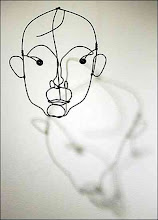A few days ago, I attended an ash-scattering ceremony for a recently departed friend, Jack Myers. Several of us gathered there took turns saying a few words, then sprinkled some of his ashes into the wind at the end of a stone quay in Winthrop Harbor, almost within shouting distance of Deer Island, where many American Indians during and after King Phillip’s War were interned (and interred) and where many refugees from the Potato Famine were processed (many died).
During dinner before the ceremony, Jack’s wife, Thea, spoke of not being able to think of being in certain situations, with certain people, in certain places without him. I was reminded not only of Hofstadter’s chapter about his wife, but also of a recent incident at home when I used a phrase that my departed friend used frequently—not only did I use his phrase, I said it the way he would have said it, and in my mind I heard him say it and saw him saying it. I mentioned this episode and Hofstadter’s theory of selves as patterns repeatable in multiple brains, and another old friend of Jack said, “My mother is definitely still in my brain, and she won’t get the hell out!”
It’s easy to dismiss that kind of relationship as simple influence, but it’s more complex than mere influence. These patterns are not just memories—they are active. They are agents in our personalities and partially constitutive of our behavior.
All of this adds a new level of depth (at least for me) in thinking about persona poems (taking on the voice of someone else in the poem) and gives me a new appreciation for a poet like Ai, whose persona poems are among the most vivid of any I know. Does this mean that Ai (also recently departed) was particularly adept at taking on the vision of others—that is, that she was a particularly gifted empath? Or might it mean that she simply was able to let the multiple aspects of her own “self” speak? Is there a difference? Is there a difference between writing a persona poem in the voice of another person and attempting to write from an impersonal (or a-personal) position? Is that possible?
I’ve long had problems with the idea of “voice” in poetry, largely because one of the most useless axioms of creative writing instruction is “you must find your own voice”, as though we all have only one true voice and the job of the poet is to find it and cling to it like a hidden treasure. Wouldn’t it be more useful to say that the poet’s job is to become attuned to multiple voices, to allow one’s attention to voices change, to modulate? Jack was a poet, and he did just that. By the mid-80s, he had a distinctive, ironic but sincere, tragicomic voice that Seamus Heaney called “wise in its pretense of just fooling around.” He was a post-confessional poet and a link in the line of conversational poets between Richard Hugo and Marvin Bell at one end and Billy Collins, Bob Hicok, and Tony Hoagland at the other. He could very easily have clung to that very successful voice and written the same kind of poem for the next 30 years. But he didn’t—he knew that he had too much to learn about himself and about the world, too much to miss by not exploring new ways in which poems can get said.
I’m sure Jack thought of the voice in all of his poems as being identifiably and distinctively Jack, himself. But that kernel of self is merely an illusion—for Jack, for example, it was made up of his childhood in Winthrop, his children, his love for the ocean, lobstering, his jobs as a house painter and mailman, Jungian psychology, Zen, his teaching, his teachers, all of the poets he read and loved, etc. All of these agents had a direct bearing on his “voice” in his poems; in what way is it useful to think of that multitude of things as a single thing, a unitarian voice? Isn't voice, as Hofstadter might say, just a pattern? Or, to look at it another way, isn't all voice persona? Either the poet speaking as someone (or something) else (or as nothing) , or the world speaking as the poet?
This line of thought also brings to mind Bloom’s Anxiety of Influence argument, in which the poet is in agonistic competition with his/her significant predecessors (the father). Bloom’s argument is attractive in that it acknowledges the inherent difficulty in the attempt to establish voice in a poem and acknowledges that voice comes out of other voices, but one must realize that one can never get there. There is never a point where one can say “I have established an original and unitarian voice free of the influence of my predecessors.” One can never slay the father, or Jung, or the lobsters (whether of the arsenic or organic variety), or Neruda. It’s impossible; there would be no self without other selves to constitute it.
I think Jack would essentially agree with the argument that the self is made up of many components, but I think he would in the end take issue with the idea that there is no central self. He was a student, after all, of Zen. But I also think he would point to the fact that one can readily recognize a Myers poem, a Sexton poem, a Ginsberg poem as evidence that there is something essentially “I” in there. He would also argue that one would be unable to write meaningful poems if it weren’t for some gathering force and if it weren’t for a central set of wants, hopes, regrets. Many times I heard him rail against “postmodernist relativism” and “deconstructionist mumbojumbo” in favor of the lyrical self, regardless of whether or not it is an illusion. And here he is doing it again.
Subscribe to:
Post Comments (Atom)




No comments:
Post a Comment